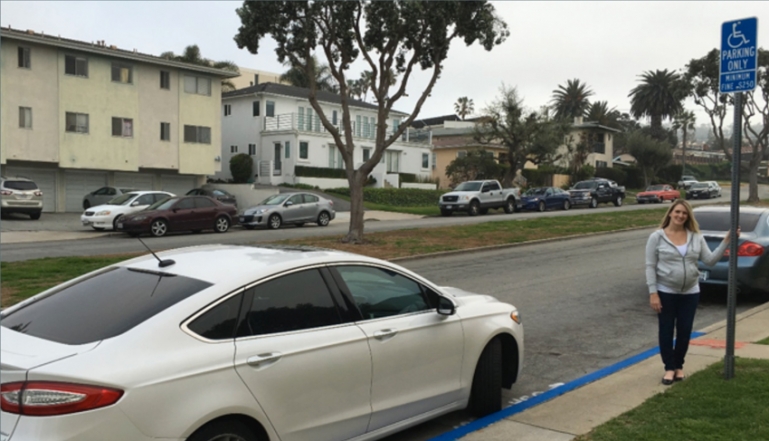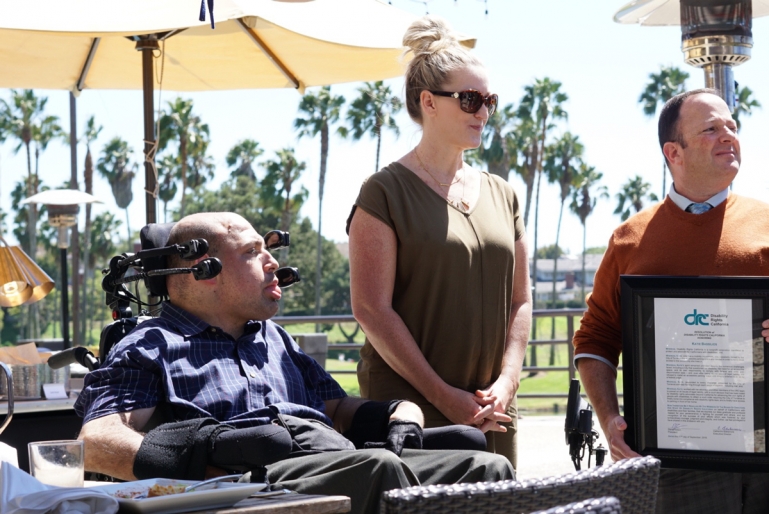DRC client challenged the City of Torrance’s refusal to designate a space in front of her building as disabled parking

DRC client challenged the City of Torrance’s refusal to designate a space in front of her building as disabled parking

Katie Bassilios has Cerebral Palsy and it is hard for her to walk more than 50 feet. For a long time Katie could not get from her apartment to her car because she had to walk up a long difficult slope or a flight of stairs to get to her designated parking space behind her complex.
Before DRC intervened, Katie would try to find a parking space on the street in front of her complex because it was closer than her assigned parking spot. However, when those spaces were occupied she had to either park further away or try to walk from her assigned parking spot. Both options were difficult for her. Katie asked the City of Torrance to designate a space in front of her building as disabled parking by painting the curb blue. It was a minimal cost to the city.
 State law allows cities to designate parking for people with disabilities who have a placard. However, the City of Torrance did not provide any designated on-street parking. In fact, the city had denied all requests for designated on-street parking for people with disabilities since 1999, at the time of this case, there were no designated on-street disabled parking spaces in the city. The city claimed that it was a popular beach town and that parking was at a premium. This did not comply with the Americans with Disabilities Act (ADA).
State law allows cities to designate parking for people with disabilities who have a placard. However, the City of Torrance did not provide any designated on-street parking. In fact, the city had denied all requests for designated on-street parking for people with disabilities since 1999, at the time of this case, there were no designated on-street disabled parking spaces in the city. The city claimed that it was a popular beach town and that parking was at a premium. This did not comply with the Americans with Disabilities Act (ADA).
“I couldn’t believe a city would take a position like that against residents with disabilities who simply want to live at the beach,” Katie said. “It made no sense.”
She contacted DRC and attorneys Autumn Elliott, Dara Schur, and Andrew Berk filed a complaint in Federal court, saying the City of Torrance violated the ADA for failing to provide equal access to on street parking and denying her a reasonable modification for her disability. The city argued that on-street parking was not a city service and that it had no obligation to make parking accessible to persons with disabilities.
 The court ruled in her favor and ordered the city to install a blue curb parking space, finding that parallel parking is a city program subject to the ADA. The presiding U.S. District Court judge called the city’s arguments “absurd” and “cavalier”. In his ruling, the judge found that the city’s argument that its popular and desirable beach location should exempt it form the ADA was “regrettable.” He confirmed that the ADA and Rehabilitation Act of 1973 “make it crystal clear that persons with disabilities belong anywhere they want to be; indeed, the very purpose of these statutes is to ensure that disabled persons enjoy the freedoms that all others enjoy and that they are not segregated from the rest of society by reason of their disability.” Katie Bassilios said, “I felt supported and understood when I worked with DRC.”
The court ruled in her favor and ordered the city to install a blue curb parking space, finding that parallel parking is a city program subject to the ADA. The presiding U.S. District Court judge called the city’s arguments “absurd” and “cavalier”. In his ruling, the judge found that the city’s argument that its popular and desirable beach location should exempt it form the ADA was “regrettable.” He confirmed that the ADA and Rehabilitation Act of 1973 “make it crystal clear that persons with disabilities belong anywhere they want to be; indeed, the very purpose of these statutes is to ensure that disabled persons enjoy the freedoms that all others enjoy and that they are not segregated from the rest of society by reason of their disability.” Katie Bassilios said, “I felt supported and understood when I worked with DRC.”
Now, two years later, Katie regularly uses the disabled parking space in front of her building that makes it easier for her to do everything from getting to and from her job working with students with disabilities to carrying a bag of groceries into the house. To learn more about Katie’s story visit the article on Torrance Daily Breeze or read the court's decision on liability in response to our summary judgment motion.
DRC continues to fight for physical access for people with disabilities in the community.




